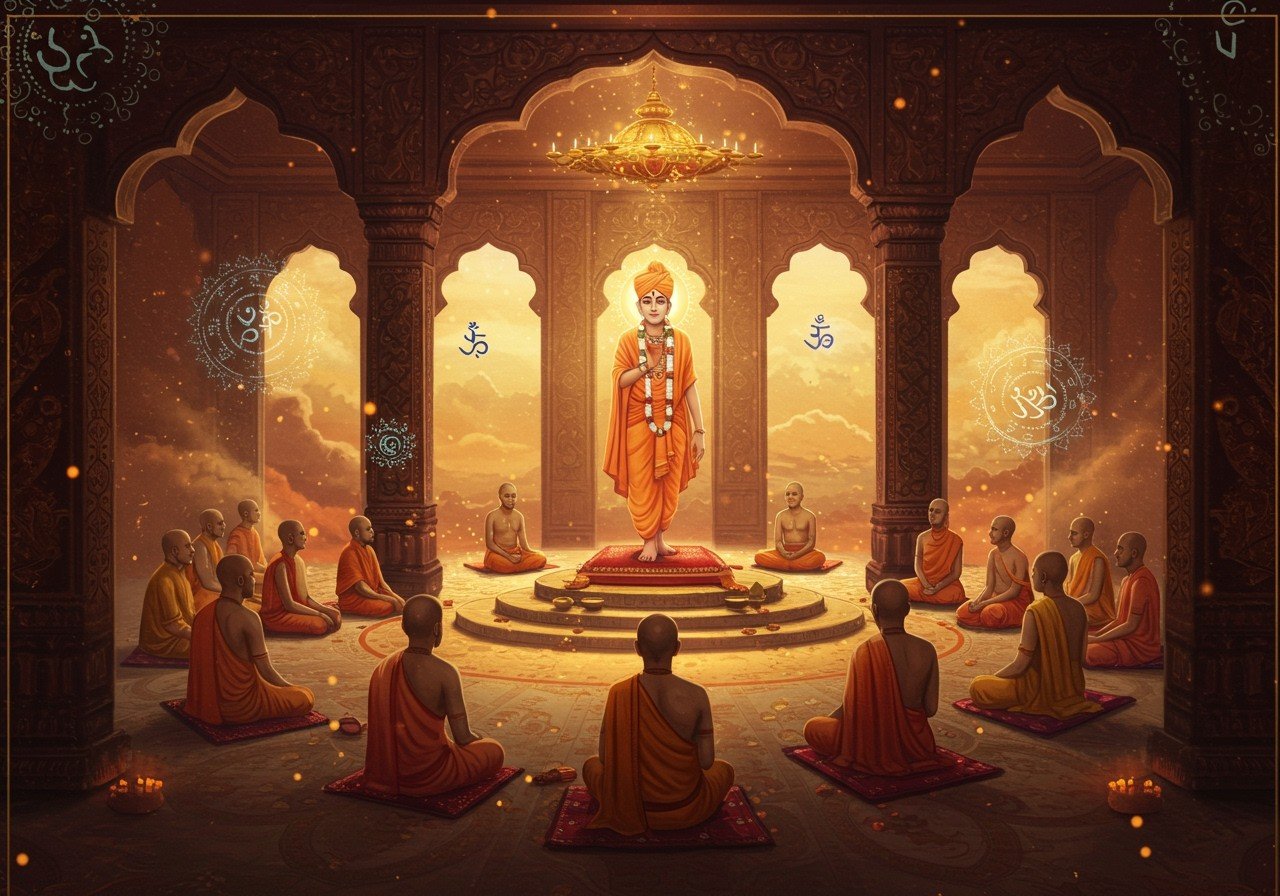
Vallabha, a name synonymous with devotion and love, resonates deeply within the tapestry of Indian culture. For many Indians, especially those who cherish their heritage, understanding Vallabha’s influence offers a glimpse into the heart of our traditions. In 2025, exploring Vallabha’s cultural impact reveals a vibrant journey through history, religious practices, and regional expressions, reminding us of the enduring power of faith and devotion.
Vallabha in the Mahabharata
While not a central figure in the Mahabharata, Vallabha’s presence is subtly woven into the narrative, sparking curiosity and scholarly discussions for centuries. The very name “Vallabha,” meaning “beloved” or “dear,” adds a layer of significance. It embodies values like dharma (righteous conduct), bhakti (devotion), and unwavering loyalty, mirroring the epic’s moral core. Scholars continue to explore the nuances of Vallabha’s connection to other characters, enriching our understanding of the ethical dilemmas and triumphs portrayed in the Mahabharata. This exploration adds depth to the epic’s cultural impact, offering diverse perspectives on Vallabha’s role in shaping the narrative’s moral compass. You can explore more on the Ramayana’s influence on Indian culture as well.
Vallabha in Telugu Culture
In Telugu culture, Vallabha’s presence shines brightly, illuminating the realms of literature, music, and religious practices. Historical accounts suggest Vallabha’s influence took root during the medieval period, blossoming into a rich tradition. Telugu literature, particularly devotional poetry and songs, is infused with Vallabha’s essence. These literary works celebrate love, longing, and unwavering devotion, echoing the very heart of Vallabha’s message.
Religious practices in Telugu regions often incorporate specific rituals honoring Vallabha. Festivals dedicated to him become vibrant community gatherings, filled with color, music, and heartfelt devotion. These celebrations hold a special place in the hearts of Telugu people, reinforcing their cultural identity and spiritual connection. Vallabha’s impact extends to Telugu classical music, where compositions praising him have become timeless treasures. Musicians and singers find inspiration in his story and teachings, carrying his legacy forward through generations. Telugu cinema also embraces Vallabha, often portraying him as a symbol of cultural values and profound devotion.
The socio-cultural implications of Vallabha’s influence are deeply ingrained in Telugu identity. His principles continue to resonate in modern-day traditions and celebrations. Families pass down his teachings, finding solace, guidance, and a sense of belonging in his message of love and devotion. You can delve deeper into Hinduism’s influence on Indian art and culture.
Vallabha in Kannada Culture
In Kannada culture, Vallabha occupies a revered position, embodying devotion and spiritual inspiration. Historical narratives and Kannada literature bear witness to his enduring presence, tracing his influence through the ages. Devotional movements associated with Vallabha have played a significant role in shaping Kannada spirituality, inspiring countless devotees with their emphasis on love and surrender. These movements often involve key figures and transformative events, adding layers of richness and complexity to the narrative of Vallabha’s influence.
Kannada performing arts, particularly theatre and dance, often draw inspiration from Vallabha’s teachings. These artistic expressions bring to life the values he embodies, captivating audiences and transmitting his message across generations. Karnataka’s landscape is dotted with temples and pilgrimage sites dedicated to Vallabha. Devotees from all walks of life visit these sacred places, seeking blessings, spiritual solace, and a deeper connection to the divine. Vallabha’s teachings have profoundly impacted Kannada society, influencing family values, community bonds, and the very fabric of daily life.
The relevance of Vallabha’s principles in contemporary Kannada culture is undeniable. His legacy continues to inspire artists, writers, and thinkers, ensuring that his spirit remains alive and vibrant in the hearts of the people. You can explore the core beliefs and practices of Hinduism for a broader perspective.
Vallabhacharya’s Influence on Indian Culture
Vallabhacharya, a revered philosopher and theologian, is intricately linked to the understanding of Vallabha, particularly within the context of the Pushti Marg sect. He established this Krishna-centered tradition, emphasizing devotion, love, and selfless service to Shri Krishna. Vallabhacharya’s philosophical contributions have profoundly shaped Indian spiritual thought, offering a unique perspective on the relationship between the individual soul and the divine.
His teachings emphasize the importance of divine grace and unconditional surrender to God’s will. These powerful ideas spread across India, seamlessly integrating into regional religious practices and festivals. Art, music, and literature, particularly during the Bhakti movement, became imbued with Vallabhacharya’s influence, expressing the beauty and depth of devotion through various creative mediums. Vallabhacharya’s philosophy championed inclusivity, welcoming individuals from all walks of life to seek union with the divine, regardless of caste, gender, or social status. He rejected the traditional emphasis on asceticism, encouraging householders to embrace spirituality within the context of their daily lives. This approach bridged the gap between the spiritual and the mundane, making devotion accessible to all.
Temples dedicated to Vallabhacharya grace the Gangetic plain and Gujarat, standing as testaments to his enduring legacy. Devotional music, dance, and artistic expressions continue to celebrate his teachings, keeping his spirit alive in the hearts of devotees. Even today, Vallabhacharya’s influence is palpable in contemporary Indian culture. His emphasis on pure devotion has transformed temple rituals into heartfelt expressions of love, enriching spiritual practices for countless individuals. You might enjoy learning about the history and celebration of Holi.
How Poojn.in Helps Preserve Vallabha Traditions
At poojn.in, we understand the deep significance of preserving cultural heritage. We are proud to offer a wide selection of authentic Vallabha ritual items, making it convenient for devotees across India to access these sacred materials. One such essential item is Arjun bark (known as Arjuna in Hindi, Arjuna Ela in Tamil, and Arjuna Kottai in Malayalam), crucial for many Vallabha ceremonies and rituals.
Our online platform provides:
- Certified authentic Arjun bark: Sourced directly from trusted suppliers, ensuring the highest quality and purity. We understand the importance of using genuine ingredients in your spiritual practices.
- Detailed product descriptions in multiple regional languages: Making it easy for you to understand the significance and usage of each item. We cater to diverse linguistic backgrounds, ensuring accessibility for all.
- Secure packaging to maintain purity during transit: We take utmost care in preserving the sanctity of your ritual items. Our packaging protects them from damage and contamination throughout their journey.
- Pan-India delivery to your doorstep: Bringing the sacred to your home, no matter where you are in India. We believe that access to ritual items should be effortless and convenient.
- Expert guidance on proper usage and storage: Our knowledgeable team is always ready to assist you with any questions you may have about our products. We are passionate about sharing our cultural knowledge and helping you observe traditions correctly.
Have questions about Arjun bark or other Vallabha ritual items? Reach out to us:
- Phone: 03369029784
- WhatsApp: 9476142738
Shop Related Products:
- Premium Grade Vamavarti Shankh
- Laddoo Gopal Astadhatu Brass Murti
- Laddoo Gopal (Big Size) Brass Murti
- Pure Brass Maa Tara Murti
- Pure Brass Lakshmi Ji Murti
- Storage Containers for Sacred Items
- Ritual Accessories Kit
- Puja Thali Sets
Visit www.poojn.in to explore our complete collection of Vallabha ritual items and other spiritual products. Our customer service team is always happy to help you select the right items for your specific needs. We are dedicated to supporting your spiritual journey and helping you connect with your traditions.
Conclusion
Vallabha’s cultural impact in 2025 continues to thrive, beautifully interwoven with the rich traditions of Telugu and Kannada cultures, as well as the broader Indian spiritual landscape. His presence resonates deeply in literature, music, and religious practices across the country. Telugu and Kannada communities, in particular, continue to celebrate his teachings through vibrant festivals, timeless music, and inspiring artistic performances. Vallabha’s influence, intertwined with Vallabhacharya’s philosophical insights, shapes modern-day values, spiritual practices, and community bonds. As families and communities embrace these teachings, they discover solace, unity, and a profound connection to their heritage, embarking on a shared journey of devotion, love, and spiritual growth.
Frequently Asked Questions about Vallabha’s Cultural Influence
Who is Vallabha in the Mahabharata? In the Mahabharata, Vallabha isn’t a direct character but can be related to Lord Krishna, who is revered and worshipped in many traditions. Vallabhacharya’s focus on Krishna strengthens this connection, especially within the Pushtimarg sect.
What is the significance of Vallabha in Telugu culture? Vallabha symbolizes spiritual devotion, particularly within the context of the Vallabhacharya tradition. This tradition has deeply influenced Telugu culture, inspiring devotional songs, rituals, and heartfelt expressions of love for Lord Krishna.
How is Vallabha represented in Kannada traditions? In Kannada traditions, Vallabha embodies devotion to Lord Krishna. Many Kannada-speaking individuals follow the teachings of Vallabhacharya, celebrating festivals and performing rituals that honor Krishna’s divine love and grace.
Why is Vallabha important in 2025? In 2025, amidst growing interest in spiritual practices and traditional values, Vallabha’s message of devotion and love holds significant relevance. Vallabhacharya’s teachings offer guidance and inspiration for those seeking a deeper connection with spirituality and culture.
What are the main teachings of Vallabhacharya? Vallabhacharya’s teachings revolve around pure devotion to Lord Krishna. He emphasizes surrendering to God’s will, cultivating love for the divine, and practicing seva (selfless service).
How can one participate in Vallabha traditions today? Engaging in devotional practices like singing bhajans (devotional songs), attending satsangs (spiritual gatherings), and celebrating festivals dedicated to Lord Krishna are ways to participate in Vallabha traditions. Visiting temples and joining community events further immerse individuals in this spiritual path.
What role does Vallabha play in modern spiritual practices? Vallabha offers a path of devotion and surrender in modern spiritual practices. His teachings guide individuals towards finding joy and fulfillment through a connection with the divine, influencing contemporary spiritual seekers.
How do Vallabha’s teachings influence cultural practices? Vallabha’s teachings encourage community gatherings, devotional music, and rituals centered around Lord Krishna. These practices play a crucial role in preserving cultural heritage and fostering a sense of unity among followers.


